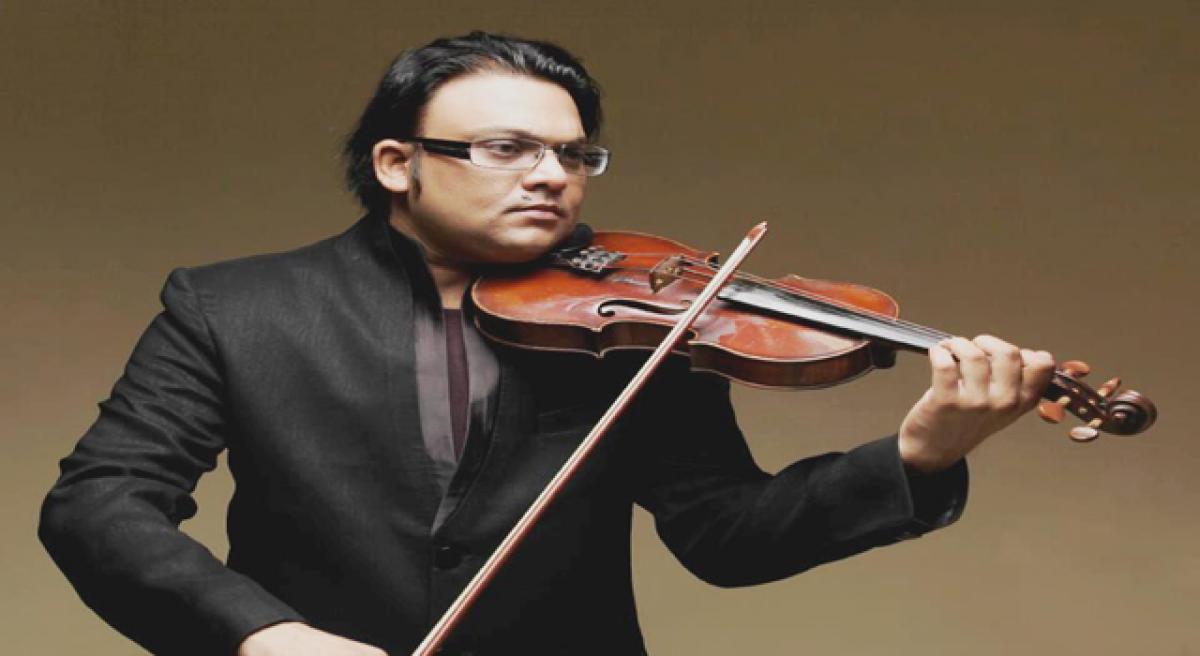Live
- Spiritual fervour marks Karthika Pournami
- Give big nudge to solar power production thru SHGs: Bhatti
- VIT-AP celebrates National Library Week
- Experts flag concern over faulty upkeep of tracks, chinks in infra
- Render services for people’s upliftment
- Safe Stay Audit programme for IT and ITES sector launched
- AP CM Chandrababu meets union ministers in Delhi, to visit Mumbai today
- Ponnam warns against negative propaganda of ongoing survey
- Hyderabad: Enumerators jotting down details with pencil nettles families in city
- First Lokmanthan event in South India to be held in city: Kishan
Just In

Deepak Pandit, well known violinist and composer of music is the son of Qawwal Shambhu; of the famous Qawwal duo ‘Shankar-Shambhu’. In addition to his tryst with music, as an accompanist musician, fusion artist, a solo performer, a band member and composer from films (‘Name Sake’ & ‘I am Kalam’), he is also a Sufi singer well rooted in tradition. He speaks to The Hans India on his visit to Hyderab
Deepak Pandit, well known violinist and composer of music is the son of Qawwal Shambhu; of the famous Qawwal duo ‘Shankar-Shambhu’. In addition to his tryst with music, as an accompanist musician, fusion artist, a solo performer, a band member and composer from films (‘Name Sake’ & ‘I am Kalam’), he is also a Sufi singer well rooted in tradition. He speaks to The Hans India on his visit to Hyderabad for the annual music programme, ‘Monsoon Nirvana’.
How did you take up the violin at a young age?
Music was all around in my family. I started learning vocal music and also tabla from my father. In the olden days, there was a system that any musician would learn both these forms to get a basic understanding of melody and rhythm. Later, I started learning violin from my father who himself had a great hidden talent for violin. In fact, I play a German violin which is more than 100-years-old and was always used by my father since his young days. I completed my degree in music from Prayag Sangeet Samiti of Allahabad.
What is your understanding of ‘Sufi music’?
Sufi music is about dedicating the ‘Self’ to one’s ‘Inspiration and Belief’. My father was so dedicated and devoted to ‘Sufism that he would always visit ‘Khwaja Garib Nawaz’ in Ajmer. He even got the title ‘Khwaja Pasand Khitab’. There is a particular way of starting, leading and ending a Sufi performance. Very few modern day performers follow this tradition. It is unfortunate that a new trend of ‘flashy lights, big sound and lot of body movements’ has taken over and brought in a very peculiar ‘Commercial Sufism’, more of an entertainment kind. My brother Rakesh Pandit and my cousin Ram Shankar carry on the legacy of ‘ShankarShambhu’ with their traditional Qawwal singing.
How has life been as a musician, composer, accompanist and music director?
Since my young days, I was very blessed to share stage accompanying Ghazal Maestro Jagjit Singh for many years. In the true sense of the word ‘sharing’, Jagjit Singh would always give me lot of wonderful time in between his songs to explore and present my music to the audience. As a musician I now take out more time for solo concerts and am also busy composing music. As far as music direction for films is concerned, I am very choosy about it and welcome any film which would not curtail my creativity and independence. After all, film producers and directors need to understand that we do not interfere in their selection of ‘star cast’ or ask for changes in the ‘script’ of the film. So as such, I too would not like anyone to interfere in my thoughts and flow about the music direction for a film.
How do you define fusion music and who inspires you?
For me fusion music is all about weaving different styles and genres of music around a given ‘Raga’. For example, I may take up Raga Kirwani and explore it in Hindustani style, while my co-musicians may work out something in Raga Kirwani in maybe Jazz, Reggae, Latin, Pop or Carnatic style. Ustad Zakir Hussain is undoubtedly one of the pioneers in bringing the concept of fusion through the ‘Shakti’ band. It was not about artistes coming together on stage. The artistes knew each other personally so well and the team was more like a family for a long time. Stage was just incidental. When the minds meet ‘off stage’, then success automatically comes ‘on stage’. And how can I forget the great ‘Double Violin’ star L Shankar. He was a phenomenon of ‘fusion’ during his younger days.
Do you enjoy ‘Studio recording’ or concerts?
Studio recordings give us opportunity to work with some of the big names in the film and entertainment industry. As far as the music is concerned, we have to restrict ourselves to the ‘notation’ that is written for us. Very minor variations are allowed. If I am doing my own compositions or creating music for films, then I enjoy the studio work as I have more freedom to express my flow of music. Concerts do not have any limitations as far as the ‘music content’ is concerned and it’s always a joy to do them.
By: Jaywant Naidu

© 2024 Hyderabad Media House Limited/The Hans India. All rights reserved. Powered by hocalwire.com







